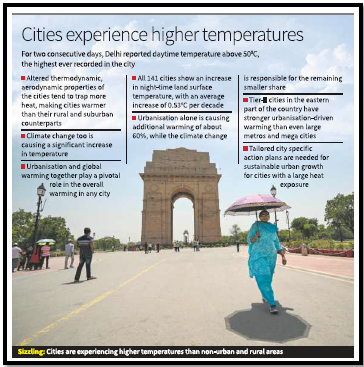“ADDRESSING URBAN HEAT ISLANDS AND CLIMATE CHANGE IN INDIA’S GROWING CITIES”
Syllabus:
- GS-3- Heat wave in north India ,Climate change ,it’s impact and solutions
Focus :
- The article focuses on the combined impact of climate change and rapid urbanization on the increasing temperatures in Indian cities, specifically through the urban heat island (UHI) effect. It emphasizes the need for tailored mitigation strategies at both local and regional levels to manage urban heat and ensure public health and climate resilience.
Source - TH
Introduction
- Delhi recently reported record-breaking temperatures above 50°C, the highest ever recorded.
- Urban areas experience higher temperatures than rural counterparts due to the urban heat island (UHI) effect.
- Climate change and rapid urbanization are key factors defining the Anthropocene, significantly impacting urban populations.
- India’s urban population is projected to double by 2050, adding over 450 million residents.
- The combination of climate change and urbanization poses significant challenges for future urban resilience.
The Urban Heat Island Effect
- Urban areas have altered thermodynamic and aerodynamic properties, trapping more heat than rural areas.
- Concrete structures, roads, and buildings absorb and retain more heat, leading to higher temperatures.
- The UHI effect exacerbates heat in cities, especially during heatwaves.
- Air conditioning and vehicular emissions further contribute to urban warming.
- Understanding and mitigating the UHI effect is crucial for public health and urban planning.
Climate Change and Its Impact
- Climate change is causing an increase in record-breaking temperatures and prolonged heatwaves.
- The combined effect of global warming and urbanization leads to complex warming patterns in cities.
- Changes in temperature influence micro-climates, affecting heat distribution, rainfall, and air pollution.
- Increased temperatures have significant public health implications, including heat-related illnesses and mortality.
- Adapting to climate change requires targeted strategies to mitigate its impact on urban populations.
Research Findings on Urban Warming
- A recent study analyzed the contributions of urbanization and regional climate change to warming in 141 major Indian cities.
- High-resolution night-time land surface temperature data from NASA’s MODIS sensor was used for analysis.
- The study compared urban warming with rural counterparts to isolate the impact of urbanization.
- Findings indicate urban areas are warming nearly twice as fast as rural areas.
- Local-scale urbanization alone accounts for approximately 60% of additional warming in cities.
Variations Among Indian Cities
- All cities showed an increase in night-time land surface temperature, averaging 0.53°C per decade.
- A significant divide exists between cities, with eastern tier-II cities experiencing stronger urbanization-driven warming.
- Surprisingly, larger metros and mega cities showed less urbanization-driven warming compared to smaller cities.
- This variation suggests a window of opportunity for targeted urban heat management strategies.
- Differentiated approaches are necessary to address the unique warming patterns of each city.
Mitigation Strategies for Urban Heat
- Cities with significant urbanization contributions can benefit from local-scale interventions.
- Sustainable materials such as cool roofs and permeable pavements can reduce heat absorption.
- Green infrastructure, including parks and urban forests, helps cool urban areas.
- Maintenance of lakes and water bodies is essential for regulating urban temperatures.
- Comprehensive emission reduction strategies are crucial for long-term urban heat management.
Regional and National Scale Efforts
- Some cities may require regional-scale efforts to effectively mitigate warming.
- National and regional emission reduction initiatives are vital for broader climate impact mitigation.
- Large-scale afforestation and plantation projects can help offset urban heat.
- Rejuvenation of surrounding water bodies supports regional cooling and climate resilience.
- Coordinated efforts at both local and national levels are necessary to address extreme urban rainfall, floods, and air pollution.
| Initiatives to mitigate impact of Heat:
1. NAPCC:
2. Heat Action Plans (HAPs):
3. National Green Highways Mission:
4. Urban Forestry Scheme:
5. Smart Cities Mission:
|
India’s Commitment to Climate Action
- India is committed to reducing emissions and transitioning to non-fossil fuel energy sources.
- Updated nationally determined contributions (NDC) reflect India’s dedication to climate justice.
- State-level heat action plans aim to reduce heat-related mortality through early warning systems.
- Effective urban heat management requires a differential approach tailored to each city’s needs.
- Collaborative efforts across government levels and sectors are essential for sustainable urban development.
Source:The Hindu
Associated Article :
https://universalinstitutions.com/sc-declares-right-against-climate-change-a-fundamental-right/
Mains Practice Question :
GS-1
“Discuss the impact of urbanization and climate change on the urban heat island effect in Indian cities. Evaluate the effectiveness of various mitigation strategies at both local and regional scales to address the increasing temperatures and related public health challenges. “(250 words)




